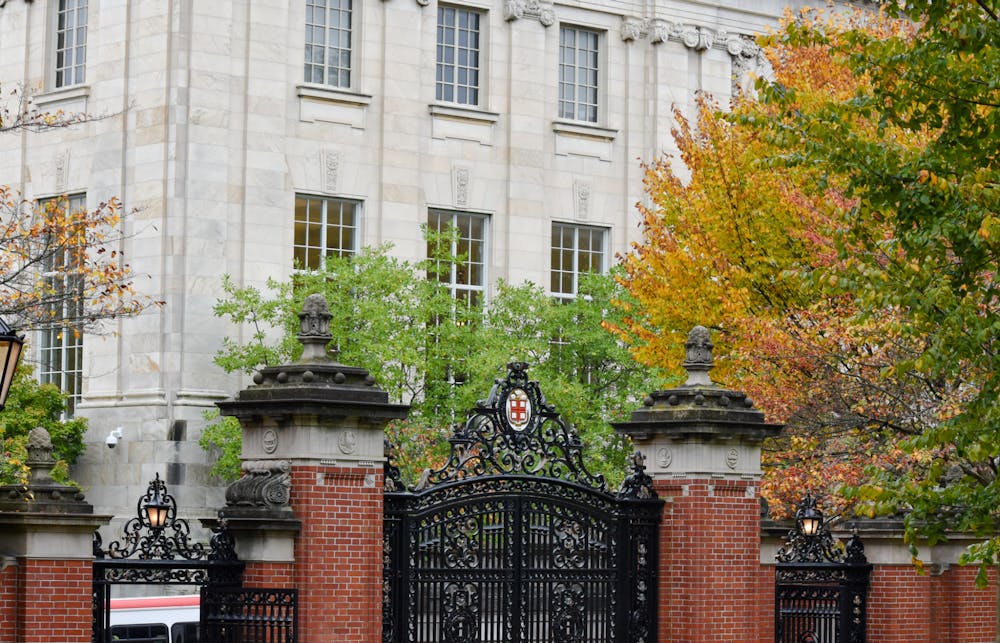The University offered 13 Ukranian applicants notice of an “advanced likelihood of admission” in the spring to the class of 2026, The Herald previously reported. The Herald spoke to some of these students as they near the end of their first semester at Brown, as well as sophomores from Ukraine, about the highlights, surprises and challenges of their time on College Hill.
Students said they have appreciated support from the University and the opportunity to connect with other Ukrainian students amid the international conflict back home.
In addition to offering these Ukrainian students advanced likelihood of admission, the University also provided these students financial aid, immigration assistance and additional advisory support, The Herald previously reported.
Oleksii Shebanov ’26, a student from Ukraine, said discovering a passion for history has been one of his favorite parts of the semester. He has appreciated the freedom to choose courses without restrictions and being surrounded by fellow students exploring their passions. “We are determined to be curious and to study something interesting,” he said.
Hlib Burtsev ’26, another student from Ukraine, is planning to concentrate in applied mathematics-biology. He added that he has taken advantage of student support resources such as CareerLAB, academic advising, Counseling and Psychological Services and his professors’ office hours.
“I tried to use every resource that we have available because it’s free,” he said. Burtsev added that he has enjoyed taking piano lessons and that the International Mentoring Program was one of his favorite parts of the semester.
Burtsev has found that he has gravitated toward spending time with other international students. Shebanov added that he feels especially connected to other Ukrainian students. “We are really bound by our common experience,” he said.
“We're constantly worrying about what is happening in Ukraine and what's happening on the front line,” Shebanov explained. “But at the same time, it gives us an energy to do something here.”
Artem Agvanian ’25, also from Ukraine, said that he is looking forward to seeing his father for the first time in a year and a half over winter break. His family moved to Lithuania as a result of the invasion, he said, and after receiving his bachelor’s degree, Agvanian hopes to find a way to connect his studies to his life back home and is considering moving back to Ukraine.
Both Shebanov and Burtsev have enjoyed meeting friends through the unofficial Ukrainian house, which holds events to raise awareness about Ukrainian current events and history, Burtsev said. While the students who attend are primarily from Ukraine and surrounding countries, the events are open to all students.
A consistent challenge for Shebanov since arriving on campus has been knowing that his family is not in a safe environment — he often worries about whether his friends and family back home will have sufficient access to electricity and drinking water.
It has also been hard, he said, to speak with them on the phone. “My parents have only two hours of electricity per day, which is terrible,” he said. “I might not talk with them for a couple of weeks because almost all my classes are in the morning. And that's the only time when they have this two-hour slot of electricity and they can talk with me.”
“I can enjoy my life with electricity — which may sound really surprising that electricity can be enjoyable — but people in Ukraine don't have this,” he added.
Shebanov also worries about the economic situation in Ukraine and how it negatively affects his family. “The economic situation in Ukraine is dreadful, to be honest — the unemployment rates, the inflation rate (and) the exchange rate of the dollar,” he said. “That's why they're struggling a lot.”
It is important that people around the world support Ukraine through this conflict, Burtsev said. Because of Russian attacks, large amounts of infrastructure in Ukraine have been destroyed, resulting in a lack of electricity in areas of the country, according to Burtsev. Without heating in his home city of Kyiv, Burtsev worries that some people will struggle to live through the winter.
Agvanian appreciates the University’s efforts to aid Ukrainian students and the resources available to them, he said. “It's always nice to know that there is some safety net and somebody has your back.”





